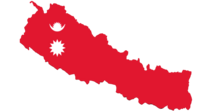fiction.wikisort.org - Writer
Bijaya Malla (Nepali: विजय मल्ल; 23 June 1925 - 24 July 1999) was a Nepalese poet, novelist and playwright.[1] Malla wrote multiple novels, plays and poems in his lifetime. He is well known for his novels like Anuradha and plays like Koi Kina Barbaad Hos, Pattharko Katha and Dobhan.[2]
Bijaya Malla | |
|---|---|
विजय मल्ल | |
 | |
| Born | Bijaya Bahadur Malla 23 June 1925 Om Bahal, Kathmandu |
| Died | 24 July 1999 (aged 74) Kathmandu |
| Nationality | Nepali |
| Education | ISc. |
| Alma mater | Tri-Chandra College |
| Occupation | Writer, poet, playwright |
| Notable work |
|
| Spouse | Shyama Pradhan |
| Children | 9 |
| Parents |
|
| Relatives | Govinda Bahadur Malla (brother) |
| Awards | Sajha Puraskar |
Early life and education
Malla was born on 23 June 1925 (10 Ashadh 1982 BS) in Om Bahal, Kathmandu as the third son to father, Riddhi Bahadur Malla and mother Ananda Maya. Malla's father was the editor and founder of a Nepali literary magazine called Sharada. Both he and his elder brother Govinda Bahadur Malla 'Gothale' were influenced by their literary family. He received his school level education from Durbar High School. He grew up reading the works of Shakespeare, Chekov and Ibsen. He received his high schooling education from Banaras Hindu University and enrolled for an ISc. (Intermediate of Science) education in Tri-Chandra College but could not complete his degree due to the political situation in the country.[3]
Literary and political career
His first poem Marnu Parcha Hai Dai was published in Sharada magazine (1997 BS, Shrawan, Year 6, Vol. 4) in 1940. His works are widely influenced by Freudian philosophy. He even served as the secretary of Nepal Academy.[4]
He was attracted towards the politics after the killing of four martyrs by the Rana government in 1941. He started getting involved in the Nepal Praja Parishad in 1948 or which he was imprisoned for two years for by the government 1948 to 1950. After 1950, Nepal Praja Parishad became Nepali Congress and Malla became the member of it. After Matrika Prasad Koirala split with Nepali congress and formed Praja Parishad, he left Nepali Congress and joined Praja Parishad.[5]
Notable works
Novels
- Anuradha (1961)
- Kumari Shobha (1982)
- Shrimati Sharada (1999)
Plays
- Patthar ko Katha (Story of a stone, 1971)
- Saat Ekanki (Seven one-act plays, 1971)
- Dobhaan (Confluence)
- Bhitte Ghadi (Clock)
- Sristi ko Parkhal Bhitra (Inside The Wall of Creation)
- Bhulaibhul ko Yetharta (Reality of Blunders)
- Koi Kina Barbaad Hos (Why Should One Be Devastated, 1969)
- Jiudo Laas (Live Corpse)
- Baula Kaji ko Sapana (Dream of A Lunatic)
Short-story collections
- Ek Bato Aneh Mod (One Road, Many Turnings, 1969)
- Pareva ra Kaidi (The Prisoner and the Dove, 1977)
- Manchhe ko Naach ra Anya Katha (A Man's Dance and Other Stories, 1995)
Poems
- Bijaya Mallaka Kavita (Poems of Bijaya Malla, 1959)
Awards
He was awarded with Sajha Puraskar for his anthology of short stories, Ek Bato Aneh Mod in 1970. He has also been felicitated with other honors such as Ganki Bashundhara Puraskar (c. 1992), Bhupal Man Singh Karki Puraskar (c. 1996) and Ved Nidhi Puraskar (c. 1999) for his contribution to Nepali literature.[6]
Personal life
He got married to Shyama Pradhan in 1999 BS (c. 1942/ 1943) in Kathmandu. They had nine daughters (Nalini, Reeta, Neena Sheela, Uma, Rama, Srijana, Archana, Bandana) among whom Sheela died during childhood. He died on 24 July 1999 (8 Shrawan 2056 BS).[7]
See also
References
- "नाटककार विजय मल्ल र उनको 'पत्थरको कथा' एकाङ्की". Balsirjana (in Nepali). 2020-09-09. Retrieved 2021-12-12.
- "विजय मल्लका तीन कविता". themargin.com.np. Retrieved 2021-12-12.
- "Himalayan Voices". publishing.cdlib.org. Retrieved 2021-12-12.
- @therecord. "Bijaya Malla on being, dying and writing: an interview from 1966 - The Record". www.recordnepal.com. Retrieved 2021-12-12.
- विजय मल्लको जीवनी, व्यक्तित्व र कृतित्व (PDF) (in Nepali). pp. 42–83.
- "विजय मल्ल: बहुमुखी साहित्य स्रष्टा". Dabali Khabar डबली खबर. 2019-08-11. Retrieved 2021-12-12.
- "यारोँका यार". Naya Patrika (in Nepali). Retrieved 2021-12-12.
Другой контент может иметь иную лицензию. Перед использованием материалов сайта WikiSort.org внимательно изучите правила лицензирования конкретных элементов наполнения сайта.
WikiSort.org - проект по пересортировке и дополнению контента Википедии
